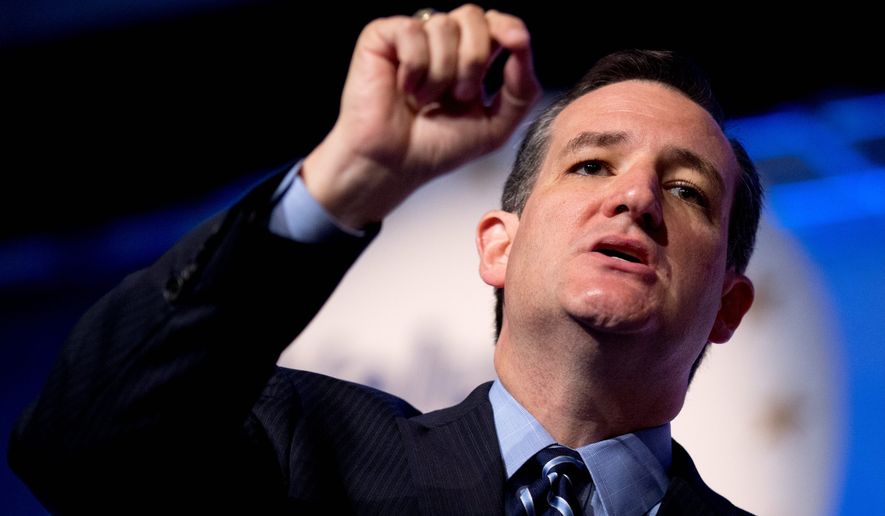Some potential 2016 GOP presidential candidates said Monday’s Supreme Court decision to let same-sex marriage stand in dozens of states settles the issue — but religious conservatives vowed to continue to fight, saying opposing gay marriage remains a litmus test for White House hopefuls.
Robert Vander Plaats, head of Family Leader, a Christian conservative organization in Iowa, home of the first presidential caucuses, said would-be candidates will have to lay out a strategy for fighting back.
“What is your leadership strategy to right this ship? What’s your remedy to this leftist takeover by judges, who are flying in the face of ’the Laws of Nature and Nature’s God?’” he said.
Sen. Ted Cruz, one of those eyeing a 2016 bid, has already risen to the challenge. The Texas Republican, who recently won the presidential straw poll at the Family Research Council’s Values Voter Summit, called the court’s decision “tragic” and vowed to introduce a constitutional amendment that would bar “the federal government or the courts from attacking or striking down state marriage laws.”
The fight stems from justices’ decision Monday not to hear appeals of a string of lower-court decisions that struck down gay marriage bans in Oklahoma, Utah, Virginia, Wisconsin and Indiana. The justices did not explain their decision, but at least four votes on the nine-judge court are needed to add the cases to the docket.
Former Arkansas Gov. Mike Huckabee, winner of the 2008 Iowa caucuses, called the court’s decision “cowardly.”
SEE ALSO: Immigration activists court Luis Gutierrez for presidential bid
But other prominent Republicans took a more muted approach, with some seemingly eager to use the court decisions to try to push the GOP past the hot-button social issue.
Wisconsin Gov. Scott Walker, a potential 2016 White House candidate, said the court’s refusal to take up the cases means the issue was now settled for his state.
“In light of the action by the United States Supreme Court, Wisconsin will uphold the law as set by the federal Court of Appeals,” said Walker spokesperson Laurel Patrick.
Indiana Gov. Mike Pence, also mentioned as a candidate, said he will always “believe in the importance of traditional marriage.”
“While it is disappointing to many that the Supreme Court has chosen not to hear arguments on this important issue, under our system of government, people are free to disagree with court decisions but we are not free to disobey them,” Mr. Pence said. “Hoosiers may be assured that I and my administration will uphold the rulings of our federal courts concerning marriage in the policies and practices of our state.”
Opposing gay marriage used to be a political winner. In 2004, then-President George W. Bush was aided in his re-election bid by evangelical voters who turned out in droves to vote for state gay-marriage bans, and who also pulled the level for him. Candidate Barack Obama declined to support gay marriage when running for office in 2008.
But polls have been shifting over the last decade as Americans become more comfortable with same-sex unions, and the GOP has been wrestling with the issue internally. Some state Republican organizations have dropped their platform planks defending marriage as the union of a man and a woman, and some Republicans on Capitol Hill have announced their support for gay marriage, including Sen. Rob Portman of Ohio, whose son is gay and who is flirting with a presidential run.
Republicans in Massachusetts and California have also fielded gay candidates who support gay marriage.
Given the shift, some party strategists have called for the national GOP to drop its 2012 platform plank demanding a constitutional amendment in favor of traditional marriage.
Many conservative Republicans in the party’s base, though, continue to oppose gay marriage — including a sizable bloc of religious and social conservatives who make up a solid chunk of the electorate in Iowa and South Carolina, which host the first and third stops in the nomination race.
Gov. Bobby Jindal of Louisiana turned Monday’s court decision into an attack on President Obama and former Secretary of State Hillary Rodham Clinton, who like Mr. Obama once opposed same-sex marriage before changing their positions.
“I know that polls show that people’s views are changing on this, [but] on this issue I am not a weather vane like President Obama or Hillary Clinton,” Mr. Jindal said. “I happen to believe that marriage is between a man and a woman.”
Hogan Gidley, a GOP strategist, said the court’s decision will also boost the issue of Supreme Court picks among the 2016 candidates.
“One of the most undervalued questions on the campaign trail is, ’Who is your favorite Supreme Court justice and what kind of justice you will nominate?’,” Mr. Gidley said. “These are the types of rulings that will force candidates to have to answer more substantially as it relates to judicial nominees.”
• Seth McLaughlin can be reached at smclaughlin@washingtontimes.com.




Please read our comment policy before commenting.